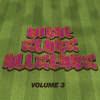Once more into the breach between ethno and techno y’all. One of the biggest tracks from my last blend in this tempo was Nic Sarno’s “Mana Wasa” which is from Enchufada’s Hard Ass Sessions Vol. 2. This EP basically consists of the evil geniuses behind Buraka Som Sistema taking a Sol Lewitt approach to kuduro and inviting a handful of non-Angolan producers to submit their vision of it. The deeper I checked it, the more I realized that this project gets exactly to the heart of some issues I’ve been thumb-wrestling with in this column from the very beginning.
Although I envisioned Ghetto Palms as a space to document the effect of digital tech on a new generation of music produced in the Third World, it immediately became obvious that not only is this music made and played in diasporic circuits like Kingston-UK-Brooklyn, Haiti-Montreal or Brazil-Angola-Lisbon but it’s impossible to separate the effect of digital tech like Frooty Loops from the effect that digital tech like mp3s and YouTube have had on the speed of collaboration and appropriation between all those corners. Accordingly, I hit Joao Barbosa from BSS/Enchufada with a barrage of annoying philosophical questions about it—which he answers graciously and insightfully below.
I will shut up and get straight to the interview after a few quick notes on the tracklisting. The gamelan-sounding polyriddim on the intro is actually a fragment of a formidable new Ethiojazz project on Addis Tunes. In keeping with the themes of this column, it’s made by a bunch of Parisian cats who decided to become the Antibalas/Dap-Kings/El Michels Affair of Ethiojam and succeeded beyond their wildest dreams. The outro is another exclusive from Mavado, who only just established himself as Jamaica’s hottest new lover’s rock artist when he decided to throw that formula out too, in order check the political establishment in Jamaica (by name!) with this call to arms. It's a fitting soundtrack to the day that the Pope of Tivoli Gardens arrives in New York to answer charges of conspiracy and narco-trafficking. In between those is the conceptual kuduro part, which consists of Bok Bok’s cerebral samba providing the perfect set-up for the anti-intellectual drums of Professor Meku. That one is conceptual kuduro, too, in its own way—the main concept being BAZOOKA.
Ghetto Palms 106 Conceptual Blend
Akale Wube, “Gubelye” Akale Wube, Addis Tunes
Bok Bok, “Dance Report” Hard Ass Sessions Vol. 2, Enchufada
DJ Mpula & Professor Meku, “Bazuka 2008”
Drop the Lime, “Sex Sax” (Sinden remix)
Baaba Maal, “The Miracle” (The Very Best remix), Green Owl
Mavado, “Can’t Believe” (Alliance Exclusive!)
Download: Ghetto Palms Conceptual Blend
GP: How did the concept for Hard Ass Sessions Vol. 2 come about?
JB: Me and Kalaf were sitting on a flight on our last US tour talking about how we would love to challenge producers to get away from their comfort zone and into the world of percussive melodies and huge kicks…aka kuduro! Initially we decided to invite people to remix original kuduro tracks, and that was Hard Ass Sessions Vol. 1, but after a while we decided it would be more interesting to try and have original foreigner visions of kuduro, and that was Hard Ass Vol. 2. We're sticking with this formula now because it keeps things way more exciting and possibilities are huge!
Is the decision in any way a reflection of what’s coming out of Angola? Do you feel the scene in Luanda has changed or fizzled out? Is new kuduro generating less heat in Lisbon/Europe?
Not really. European and American dance music production standards have a lot of cliches…things like the obvious breakdown before exploding, the classic one-minute intro for mixing, etc. What we wanna do with Hard Ass is to challenge producers to get away from those formulas and be really creative when it comes to putting a song together. This has always been the most interesting thing about kuduro from the beginning. Bok Bok's “Dance Report” on Hard Ass Sessions Vol. 2 is the perfect example of this.
Kuduro is not generating less heat, in fact it's generating more and more, as there are loads of kuduro-influenced songs around—but this kind of became normal, so people don't talk about it. At the moment house music is heavily influenced by kuduro, when you listen to something like Congorock's “Babylon” (which is being played by dudes like David Guetta or the Swedish House Mafia), the influence is very obvious and we love it!
How did you identify which artists/producers would produce these "conceptual kuduro" tracks?
We try to think of people that can think outside the box and understand what we're asking them. It's not about using a certain snare pattern, it's about feeling free to do whatever you want.
So what exactly makes a dance track "kuduro" if its not produced in the Angolan scene?
I don't think that something produced out of the Angolan scene can be called kuduro. There are certain elements that you can track down to kuduro, such as chopped up vocals used as another percussive instrument, even the lack of melody, but it's all kuduro-inspired.
What do you think are the main differences between these tracks and Angolan kuduro? Equipment? Aesthetics?
I think it's the environment where they were created. Producers in Angola make music to be played in taxis. In Europe we make it to play in clubs. So it's not about technology, it's about what you wanna do with your song.
Since BSS seems to bridge that gap, which do you consider it: kuduro or kuduro-inspired?
Buraka have always been kuduro-inspired, and we've always said it on every interview we did. But sometimes I guess it was just simpler for the journalist to write KUDURO in capital letters over our photo in the magazine.
Do you think there’s a general difference between electronic music produced in the third world (kuduro, kwaito, coupe decale, baile funk, etc) and electronic music that’s inspired by it?
We just care about talented people that make us wake up everyday inspired to do what we do, both creating music and/or making it circulate. We hate it when journalists or media use the box of "African artist" to describe someone (it always feels like they’re trying to justify possible mistakes with the lack of technology). But we also hate it when someone inspired by something but not living it is instantly considered a rip-off.
Do you have plans to continue the series? Or will the next volume of Hard Ass Sessions take yet a different approach?
We think we got the formula right this time. Volume 3 is coming out in September and the invitations have already been sent. Our favorite person in Switzerland, Wildlife, just sent us a HUGE track for it. Exciting times!
What’s next for Buraka Som Sistema? For Enchufada?
Buraka is starting on the pre-production of a new album after the summer. We rented a house where we're moving in together for a while just to focus on making music. It's going to be like music rehab! Enchufada just wants to keep on being a platform for good music, both channeling music towards people and challenging them to make something different... whatever that means!
We've got a great band called PAUS releasing a four-track EP next week.
(you heard it hear first! check their debut video below—Eddie)



